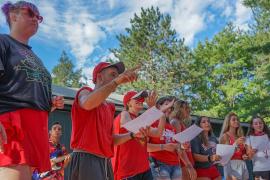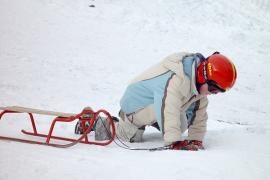As a camp counselor, you have the amazing opportunity to create life-changing moments for kids this summer.
But with long hours, high energy, and constantly shifting dynamics, it can be tough to stay grounded amidst the chaos. At the end of the day, you cannot control the weather, camper behaviors, conflicts with co-counselors, or changes in schedules. But you can control how you respond to these challenges. The only person you can control is you — your mindset, your emotional and physical health, and your actions. These tips will help you thrive all summer long:
ONE: Build Your Support System
Camp connection starts with your emotional health. Humans are social beings. We are meant to experience life alongside others. Identify fellow staff whom you can lean on during hard times. Make a habit of team bonding and connection activities like morning stretches, affirmation circles, or just shooting the breeze over meals. Allow yourself to be real, to be vulnerable, and let your guard down sometimes. However, find a balance between venting when you need to blow off some steam and listening when a friend needs a sympathetic ear. Unloading too much on others can create empathy fatigue in your coworkers. Create boundaries that allow you each to share, but then make sure to focus on positives and move toward solutions-oriented conversations with active listening.
TWO: Use Your Why
When you feel drained, come back to your core purpose. Why did you choose this role? How do you hope to positively impact kids? Reconnecting to your values gives meaning to even mundane tasks. You’ve got a superpower — share it!
Articulate Your Story, Core Values, and Purpose
What stories in your personal life impacted you as a kid and now as an adult that have brought you to this work?
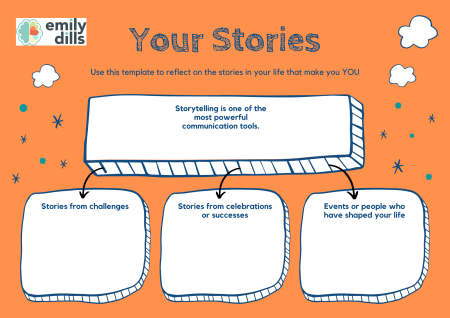
Look for patterns and themes in these stories to identify your core values and strengths.
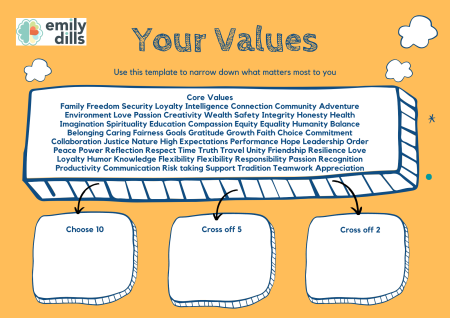
Use your three remaining core values to create your personal mission statement.
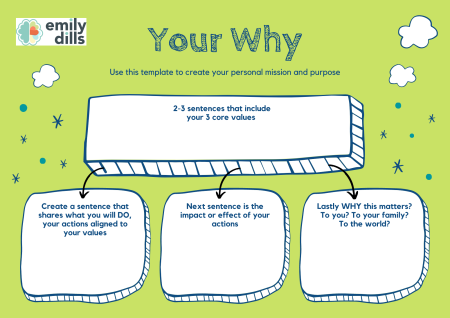
Keeping your why in mind can help ground you all summer long.
THREE: Create Safe Spaces
Kids open up in environments of consistency, warmth, and acceptance. Start each day with a check-in circle to build trust. Let campers decorate shared areas with artwork or photos. Stay calm and approachable, especially during camper conflicts or bouts of homesickness. You are their rock. Above all, listen to them, include their input in shared norms and community agreements, and set proactive structures in places to create belonging and consistency.
FOUR: Build Connections
Take the time for individual conversations during activities or downtime. Ask kids about their lives, interests, and dreams. Share authentically about yourself too. The smallest moments of listening can make a child feel truly seen.
FIVE: Teach Life Skills
Camp is about way more than fun and games. When issues arise, guide kids through problem-solving, conflict resolution, and coping strategies. Create scenarios for teamwork, goal-setting, and perseverance. These real-world skills last forever.
Think It Through
Restorative circles are so helpful in teaching life skills when challenges arise. Use the following step-by-step strategy to guide small groups of campers or your entire cabin through this problem-solving process:
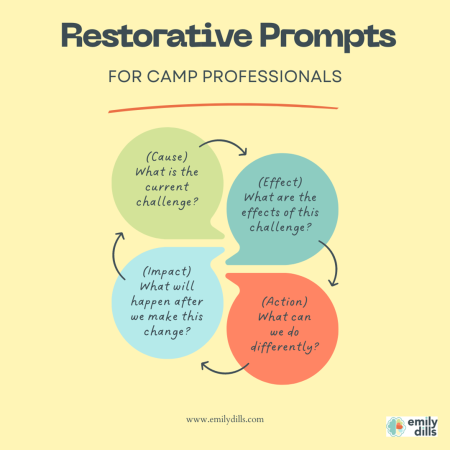
SIX: Be Proactive
Many behavior challenges stem from unmet needs like hunger, exhaustion, or anxiety. Stay attuned to your group’s dynamics and anticipate areas for confusion. Maintain structure and set expectations clearly. When issues emerge, address them positively and proactively.
SEVEN: Embrace Mistakes
Perfection is impossible in a camp setting. Give yourself grace, apologize if needed, and move forward. The best lessons come from stumbling moments if approached with reflection and a growth mindset. Have fun, and don’t take yourself too seriously.
This work is demanding but so rewarding. When you nurture your own resilience, you can nurture it in campers. Stay grounded in your purpose and keep shaping young lives.
We appreciate you. You’ve got this!
Photos courtesy of Camps Equinunk and Blue Ridge, Equinunk, PA; Wilderness Adventures, Jackson Hole, WY
Emily Dills, M Ed, is a passionate educator specializing in the areas of diversity and inclusion, social-emotional learning, and culturally responsive teaching. Emily is currently a social-emotional learning coach for eight elementary schools in her district, where she supports leaders, staff, students and families in mindfulness, educational neuroscience, and SEL curriculum. Learn more at emilydills.com.

